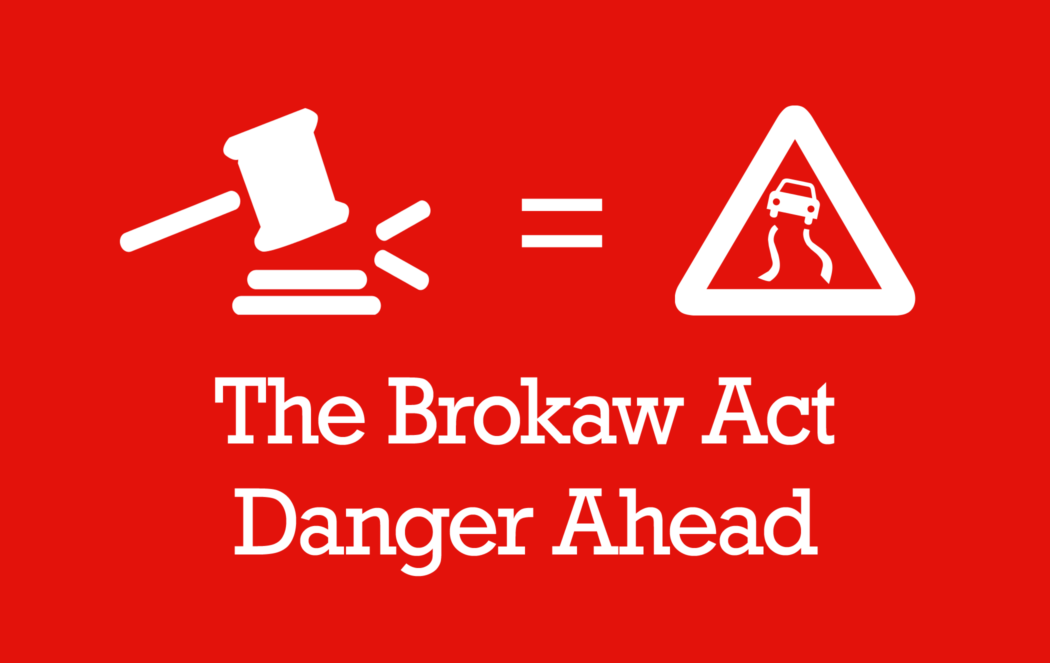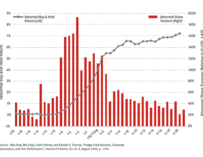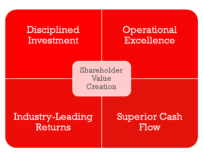The Brokaw Act Is Unusually Ill-Conceived And Destructive
Before I share my issues with the Brokaw Act, please picture this scenario and let me know if it sounds familiar. Hedge fund manager builds a stake in a public company. He believes the company is significantly undervalued. Wall Street analysts disagree.
Once a flourishing enterprise, the operation has dwindled to a mere shadow of what it once was. Out of the 15 plants and 12,000 employees only two plants and 2,300 employees remain. The writing is on the wall, but management chooses to ignore the painful facts.
The investor decides to increase his fund’s stake in the company. He has ideas on how to improve the organization’s future prospects. Management, however, is unimpressed and interactions turn decidedly more combative.
This isn’t the prelude to a new activist campaign. This is the abridged story of how Warren Buffett and his Buffett Partnership acquired Berkshire Hathaway, turning a floundering New England textile mill into one of the great success stories of American capitalism.
A lot has changed since then. And while Berkshire Hathaway’s phenomenal success is still an anomaly, good corporate governance doesn’t have to be.
Of course, if politicians and the Brokaw Act are to be believed, the 80s corporate raiders are back from the dead and set on pilfering America’s future like an unstoppable army of White Walkers.
The fear mongering shows promise. Public opinion is starting to turn against shareholder activism.
Why wouldn’t it? If I didn’t know any better, I too would lead the charge against these so-called activists, pitchfork and torch in hand.
But here’s the rub — I do know better, and so should you.
The Brokaw Act vs Activist Hedge Funds
The Brokaw Act is a bill introduced by two Senate Democrats that targets activist investors and their alleged penchant for prioritizing short-term gains for shareholders over other stakeholders, like employees and communities. The proposed legislation, sponsored by Wisconsin Sen. Tammy Baldwin and Oregon Sen. Jeff Merkley, is co-sponsored by Sen. Elizabeth Warren, the Massachusetts Democrat, and Democratic presidential candidate Sen. Bernie Sanders of Vermont.
“We cannot allow our economy to be hijacked by a small group of investors who seek only to enrich themselves at the expense of workers, taxpayers and communities,” said Senator Baldwin. “The Brokaw Act will take on a rigged game by increasing transparency and strengthening oversight of activist hedge funds.”
Leave it to a politician to equate activist investors to hijackers.
I must admit, I don’t get easily offended. In fact, I am known to say things that can be downright unpleasant, but implying that shareholder activism is somehow analogous to terrorism is the most absurd and reprehensible notion I have ever heard.
What’s more, as an American investor who spends a lot of time in Istanbul, I know firsthand the toll terrorism takes on communities and families. Wisconsin may be a long way from Paris and Brussels, but that is not an excuse to be this callous in promoting a useless piece of legislation.
The Brokaw Act vs The Facts
The Brokaw Act is named after a small Wisconsin town that, according to Senator Baldwin, “went bankrupt after an out-of-state hedge fund closed a paper mill that had provided good jobs to the town for over 100 years.”
The hedge fund in question is New York-based Starboard Value, headed by Jeff Smith. And while we don’t know all the details of Starboard’s investment in Wausau Paper, we do know the following three things: 1) Starboard was not a short-term investor. The fund was a top Wausau Paper shareholder for many years; 2) Starboard was not betting against the company nor was the firm secretly voting for its investment to fail; 3) Starboard was not part of an activist investor “wolfpack” that grouped together to push for corporate changes. For those paying attention, none of the three pillars of the Brokaw Act are applicable in the Wausau Paper case on which the entire Brokaw Act is based.
Put another way, the Brokaw Act is supposed to prevent certain events from reoccurring that, in reality, have never happened. Doc Brown, bring the DeLorean around.
The Brokaw Act is just the latest effort by Congress to provide yet another insulation for corporations by tipping the balance of regulation in favor of management. The premise is, as always, that activist investors are a key proponent of the short-termism trend that has captivated Wall Street. No one disputes that short-termism is an issue, but activist hedge funds are not the cause and the Brokaw Act is not the cure.
It defies logic to argue that activist investors foster short-termism when their average investment time horizons are measured in years rather than quarters. Furthermore, it is disingenuous to cherry pick and single out the few cases where activist-driven corporate changes failed to have the intended impact while ignoring the fact that the companies in question were already on a well-established downward trajectory.
The truth is, activist investors don’t wreak healthy companies nor do they bankrupt small Midwestern towns. Quite to the contrary, the majority of companies show improvements long after activist-driven corporate changes are implemented. That is why reality is distorted to suit an argument that cannot pass even the most basic scrutiny.
What’s worse, the Brokaw Act is trying to convince the public that activist hedge funds are to blame for all future economic ills that may one day befall Corporate America. It is a brilliant strategy since it frees critics from the weight of the available evidence by shifting the focus into the future.
Why get tied down by real research when you can let your imagination run free and paint a doomsday picture that is impossible to disprove? How do you refute the likelihood of certain future events occurring without the help of a psychic? You can’t, because any attempt to ground the conversation in facts will make you look defensive and guilty.
It’s Minority Report meets Wall Street.
The Brokaw Act vs Accountability
The Brokaw Act is a new form of legislation aimed at weakening accountability. And when economic growth and value creation is a priority, investors are right to be alarmed by the onslaught of attempts to curtail shareholder activism under the guise of anti-short-termism and other veiled efforts to restrict shareholder rights.
But do not take my word for it; look at Japan.
The trouble that Japan and a host of other countries had to cope with is the painful reality that whenever shareholder activism is discouraged and shareholders are passive (for structural, social, cultural or other reasons); corporations and economies can be doomed to underperform for a generation or more with no chance of real improvement.
You do not want to try this at home.
Moreover, most controlled companies underperform non-controlled firms in terms of revenue growth, return on equity, and total shareholder returns, even though average CEO compensation is three times higher at controlled companies with multi-class stock structures than at single-class stock controlled firms and more than 40 percent higher than average CEO pay at non-controlled firms.
Is it any surprise that major institutional investors and public pension funds start to question whether today’s boards serve shareholders’ best interests?
While many countries are introducing reforms that are meant to strengthen corporate governance, the Brokaw Act, and legislation like it, strives to turn back the clock to a time that favored the imperial CEO.
Times are indeed changing. And strange times make for strange bedfellows.
Who would have imagined that Sen. Bernie Sanders, of all people, would one day emerge as the protector of entrenched management?
The Brokaw Act vs Transparency
Transparency is a good thing and should always be encouraged. Unfortunately, the Brokaw Act does little to improve on the Dodd–Frank Act. Instead, the Brokaw Act tries to present itself as a constructive piece of legislation that “removes the opportunity for riskless gains that activists achieve” by shortening the 13 (d) disclosure window to two days.
Again, the premise is that activist investors are short-term traders, which is false and easy to disprove.
Shortening the disclosure window would only do one thing and one thing only: It would discourage shareholder activism by preventing activists from building meaningful minority stakes in public companies.
Cynics might say that the only purpose of the Brokaw Act is to target activist investors and prevent shareholder activism altogether, without the need to dilute current corporate governance reforms.
Who needs poison pills, staggered boards, and multi-share class structures when the Brokaw Act is looking out for your best interest?
Win-win for clubby boards and management. See you on the golf course.
The Brokaw Act vs Short Sellers
For those of you keeping track of terrorism analogies, here is one that should keep you up at night: Incompetent and corrupt management has destroyed more families and wealth than all the terrorist attacks in the U.S. combined.
In the case of Enron alone, management’s actions wiped out 5,600 jobs and more than $60 billion in retirement savings and investments.
The reason the Brokaw Act is so ill conceived and destructive is that it will not only help pave the way for more long-term problems, but encourage what should be discouraged. Short sellers are the perfect patsy.
Nobody likes short sellers and nobody likes to defend them. There are many reasons why, but one in particular is that short selling is still viewed as an un-American way of investing. Most people feel there is something inherently unpatriotic and wrong about taking a position that will profit from any subsequent decreases in a company’s value.
The Brokaw Act seems to share that sentiment, choosing to overlook the importance of short sellers in identifying fraud, deflating bubbles and being the buyers of last resort when markets crash.
You look at David Einhorn’s call on Lehman Brothers in which he shared his analysis that the firm is undercapitalized and in need of recapitalization. Not only was he ignored, but Lehman Brothers continued buying back shares.
Had Lehman recapitalized instead, management could have changed the course of the financial crisis. Not only that, but the firm might still be around, 26,000 employees might still have a job, and shareholders might have gotten something out of their investment.
The same can be said about Jim Chanos’ call on Enron and Bill Ackman’s call on MBIA.
The problem with short selling is that it is praised until markets turn sour and the blame game begins.
The Brokaw Act is taking a very myopic view of activist investors and short sellers by focusing on the exceptions that prove the rule: Shareholder activism and short selling are an essential part of healthy public markets that have a net benefit to society — critics and Brokaw Act notwithstanding.
Full disclosure: I am deeply biased due to my background, but it is nonetheless my firm belief that whenever management is relegated to the role of caretakers and companies are left “ownerless”, a strong board can be beneficial for all stakeholders.
The key is to acknowledge that management accountability is something that should be protected and not curtailed.
The Brokaw Act and its sponsors choose to disagree.






Related Articles